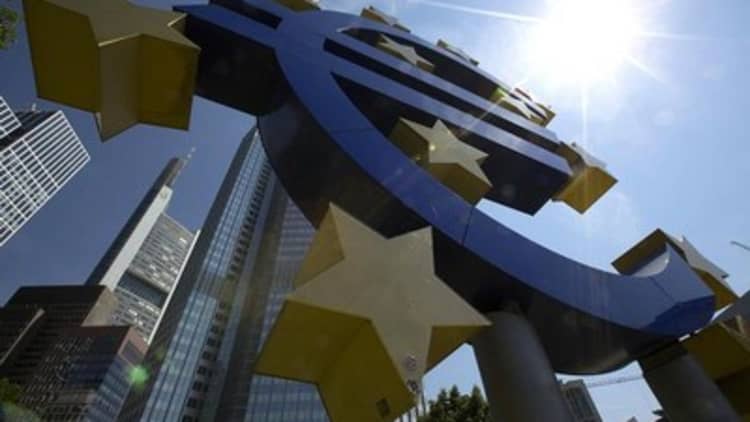
Greece's talks with its euro zone neighbors over its debt burden and bailout program came to a climax in Germany Thursday as the two countries' combative finance ministers met for the first time.
After a week of touring Europe's financial capitals in an attempt to drum up support for a renegotiation of Greek bailout program -- and a decision by the euro zone's central bank to cut off cash to Greek banks -- Finance Minister Yanis Varoufakis met German Finance Minister Wolfgang Schaeuble in Berlin Thursday.
Speaking at a press conference following their meeting, Schaeuble said that to summarize the talks they had "agreed to disagree" but that they both had a "moral duty as Europeans to understand each other and to find solutions."
Talks between the two ministers were expected to be tense, to say the least, with analysts speculating that Germany could put the final nail in the coffin for Greece's hopes of a debt deal with its fellow euro zone countries and the "troika" of the European Commission, European Central Bank (ECB) and international Monetary Fund.
Schaeuble said reforms were unavoidable in Greece and that the government had to cooperate with the troika. "We agreed that the haircut is not on the agenda, it's off the table," Scheuble added. "Everybody in Europe can be rest assured that Germany will do everything in its power to ensure that Europe is fit for the future."
He said he was "skeptical" about some of Greece's proposals, though he did not specify which ones, although he could have been referring to an earlier proposal from Varoufakis this week to swap Greek debt for growth-linked bonds.
Following Schaeuble's comments, Varoufakis said from his standpoint "they didn't agree to disagree but had agreed to enter into joint deliberations" to find solutions to a "seemingly never-ending crisis."
"It's time to draw a line and put an end to it," he said, adding that Greece would "stop at nothing" to combat tax evasion and the country's "flimsy business model."
"From our government you can expect a frenzy of reasonableness," he said and a readiness to implement macro-economic reforms that work -- but he emphasized Greece needed time.
A leaked German government document seen by Reuters Wednesday showed Schaeuble was expected to take a hardline stance with Greece, insisting that the the Greek government rows back on its election promises and continues to work with the troika.
Read MoreMarkets hit as ECB plays hardball with Greece
There's no love lost between the two nations as Germany has been one of Greece's new left-wing government's biggest critics, warning it to stick to austerity measures and refusing to consider debt restructuring for Greece, let alone a haircut on Greek debt, which it says is out of the question.
And on top of the noises from Berlin, the Frankfurt-based European Central Bank late Wednesday announced that it will no longer allow Greek sovereign debt to be used as collateral.
Wiggle room?
For its part, Greek ministers have appeared to step back from their bullish anti-bailout rhetoric that was heard in the Syriza-led government's first days of power. Both Varoufakis and Greece's Prime Minister Alexis Tsipras have struck a more conciliatory tone when meeting their euro zone partners this week.
"(Greece's strategy) faces its biggest test, as well as its biggest obstacle in the form of German finance minister Wolfgang Schaeuble who, despite some of the mixed messages being given out by other EU leaders has been remarkably consistent in his tone towards the new government in Athens." Michael Hewson, chief market analyst at CMC Markets U.K., said in a note Thursday.
Greece's room to manoeuver over its debt was dealt a further blow Wednesday after the ECB said it would no longer accept Greek government bonds as collateral, sending a clear message to Greece that it was willing to play hardball over the country's bailout program.
Read MoreECB:Banks can't use Greek debt as collateral
The ECB said in a statement that it was no longer able to assume there would be a successful conclusion to the Greek government's bailout talks with its lenders.
The move set the negative tone of European markets on Thursday with the Athens stock exchange opening almost 9 percent lower. Meanwhile, the yield on Greece's 10-year government bonds rose 82 basis points to trade at 10.84 percent.
The ECB's move had put a lot of pressure on Varoufakis to concede more ground over the debt deal, Robert Kuenzel, director of euro area economic research at Daiwa Capital Markets, said in a note Thursday.
"The latest ECB move thus tighten the screws on Greece's ambitious and confrontational course to abandon the troika, reject further bailout loans and reverse some of the economic reforms achieved in recent years," he said.
Economist and strategist at Entext Economics, Sean Maher, told CNBC Thursday that Germany needed to afford the country some room to manoeuver over its debt and that it should accept a proposal made by Greece that it could outstanding debt for growth-linked bonds.
"Greece has done a huge lot of heavy lifting and institutionally we know it's very weak and now you've got a government now willing to make hard decisions and fix the institutional shortcomings and surely for Germany this is ultimately what they need," he said.
He hoped Germany would "run with" Greece's latest proposals.
"It would be very destructive if they were to play hard ball and be intransigent with Greece over the next couple of weeks," he warned.
The euro group of finance ministers are due to hold an emergency meeting on February 11 to discuss Greece, ahead of a meeting by heads of state the following day, where a more solid decision on Greece could be taken.
- By CNBC's Holly Ellyatt, follow her on Twitter @HollyEllyatt. Follow us on Twitter: @CNBCWorld


